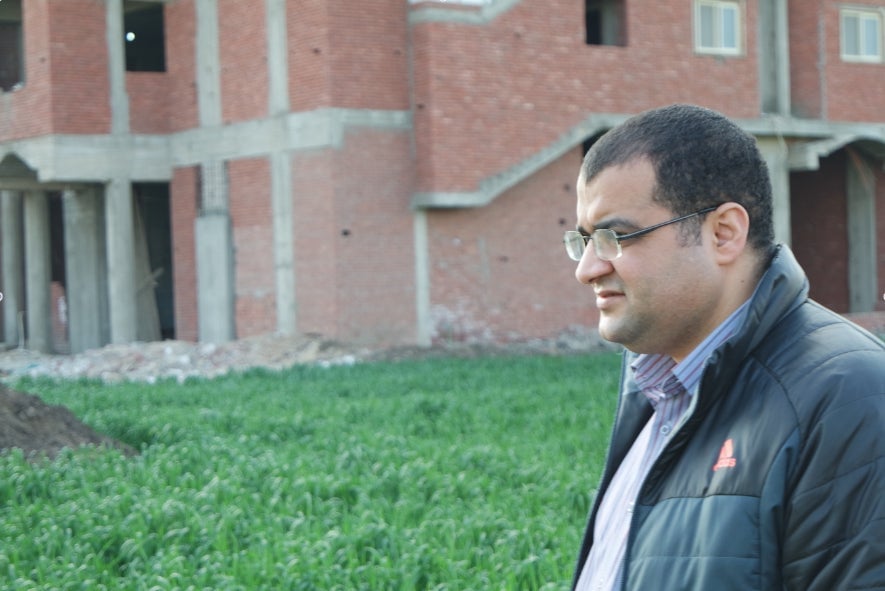An Egyptian TV producer is building a hospital by raising funds on Twitter
On a lazy weekend in El Shabraween, a village in Egypt’s delta about 110 kilometres east of Cairo, Mohamed El Garhey is hard at work lining up chairs in a circle for a meeting with locals to discuss the village’s needs. They meet on the premises of the first floor of the 25 January Hospital that he helped make reality by raising funds and awareness through Twitter.


On a lazy weekend in El Shabraween, a village in Egypt’s delta about 110 kilometres east of Cairo, Mohamed El Garhey is hard at work lining up chairs in a circle for a meeting with locals to discuss the village’s needs. They meet on the premises of the first floor of the 25 January Hospital that he helped make reality by raising funds and awareness through Twitter.
El Garhey, a news director on a major Egyptian news talk show, was inspired by the immense political change around him a few days after Egypt’s long time autocrat, president Hosni Mubarak, fell on 11 February 2011.
“We put a list of demands of people’s problems that affected their lives directly like cleaning the streets, starting a medical centre and so on,” El Garhey told Quartz. “We told people give us a year and if we can deliver, then trust us. If not, then we’re just a bunch of kids.”

It all started back in late 2011. El Garhey defied a blanket media gag and published a leaked recording of field marshal Hussein Tantawi’s testimony in the Mubarak case probing the killing of protesters. Tantawi headed up the Supreme Council of Armed Forces at the time, which ruled the country after Mubarak’s fall. That leak helped El Garhey more than double the number of his Twitter followers overnight. Today he has over 225,000 followers.
On a whim in early 2012 while desperately seeking to raise funds for a medical centre for El Shabraween, he posted on Twitter telling Cairo residents that he would be accepting donations.
“I had the receipt book with me and I wrote on Twitter if anyone wants to help out I’ll come to them. I raised 4,000 Egyptian pounds (510 USD) in two hours” he said. “I dubbed this idea and eventual hashtag ‘The Goodness Taxi“.

It took off and El Garhey has raised over 5 million Egyptian pounds (636,000 USD) in the past four years. The smallest donations are as low as 5 pounds to the biggest that he received was 400,000 pounds ($50,000).
There’s an SMS hotline where people can donate a minimum of 5 pounds (0.62 cents) or other methods of credit card payment methods as well as cash and checks.
Since there’s low penetration of personal bank card usage among Egyptians, many of the payments come via SMS as well as the rapidly a local expanding electronics payment system called Fawri. Fawri services around 15 million Egyptians and the machine can be found in small kiosks and major shops all throughout Egypt where bills and donations can be paid. Donations can also be made on site.
“We started doing callouts on social media about the specific patients we wanted to raise money for in the village then we expanded to neighboring villages. At the end of 2012, we had a bigger dream in our sights to move from the medical centre to building a full fledged high quality hospital”.
Egypt has been left with a crumbling health system marked by decades of corruption and neglect by the state. It also has the highest number of Hepatitis C patients, nearly 9 million, in the world.
Dealing with the rampant red tape and bureaucratic maze of Egypt’s public services El Garhey pushed on, even while the country was facing many political upheavals.
Over the past five years, Egypt has had three presidents and a military regime heavily involved in political and economic life.

“We faced difficulties each step of the way. The presidency in mid 2015 granted us permission to continue building up to eight floors when it had originally stopped the project at three floors” he said. “It only worked because of social media pressure”.
The funds being raised are mainly used for construction as well as buying beds and medical equipment. All in, El Garhey estimates that it will cost 15 million Egyptian pounds ($1.9 million) to finish building, furnishing and equiping the hospital.
El Garhey speaks like a true believer in the power of social media because he has seen impressive tangible results in a short period of time. He aims to open the hospital offering cheap and affordable healthcare by 25 January 2017 to mark the sixth anniversary of when the Egyptian revolution took place. The average patient consultation costs about just over $1.
In the intense crackdown leading to this year’s anniversary of 25 January, El Garhey decided to hold off on a soft launch. Several activists and academics have been arrested, enforced disappearances by the state have spiked up as well as cafes and cultural spaces have been shut down recently. Even the interior ministry admitted that it did not want a repeat of the events of 2011 and was prepared to shoot indiscriminately at protesters if they took to the streets.
Though he’s weary that the political tide has turned authoritarian in the country, El Garhey remains committed to commemorating the revolution and to finishing his project using Twitter.
“This hospital is for everyone, those who supported 25 January or are completely against it. It’s for every Egyptian”, he noted. “If it wasn’t for the revolution, we wouldn’t be even building this hospital”.